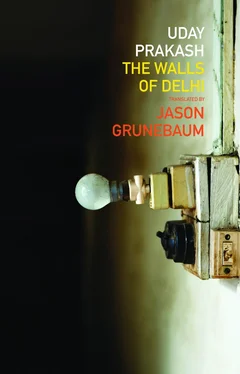Then the TV channel changed and the volume got loud. It was a music video channel. I turned around to look and saw Suri propped up against the wall, remote in hand. He regarded me with a piercing gaze, and quietly stood as his x-ray-like stare penetrated my body, and I gave a little start. Suri took his father’s finger, and, wobbling, accompanied him out the door of the half flat, his disproportionally large and heavy head resting like a time bomb atop his weak little body: every moment counting down — tick, tick, tick — to the moment (it could happen anytime) when it might explode, smashing this boy’s life into smithereens. What hour and minute the timer is set for is anyone’s guess.
Suri stopped on the balcony and turned that big head around to look at me. It was as if he was laughing with that strange twinkle in his eyes, an animated look of his very own, peering from beyond his impending death. Suri looked at Shobha again, gave a little wave with his right hand, then again took his father’s hand before disappearing down the road and into the darkness.
***
Shobha was lost in her thoughts for a bit, then finished off her glass of rum in one big swig. It was her fourth glass. She wiped her mouth with her hands, took a bite of the spicy chili-lemon channa, and said between chews, ‘Don’t think of Suri as just a kid. He’s a real imp. Nothing gets by him.’ There was a devilish look in her eyes. I was a little rattled.
‘Does he also know what goes through my head?’ The buzz from the rum and magic carpet made my speech sparkle.
She came over beside me. ‘Both Suri and Chandu know exactly what’s on your mind and on my mind right at this very moment. Can you hide something like this? At this age?’ She poured herself another little shot, and again downed it. ‘What have we got in this life anyway? And if we do have something, someone else’ll take it away. But whatever we might have left over, we can give to anyone we like. Don’t you think so?’ It came out slowly, deliberately. She leaned her head against my shoulder. ‘Look how old I am, look how old Chandu is, and we just had a baby, we’ve just bought a house. A fifteen-year mortgage. Do you think we’ll even be around to see it paid off? I look behind me and I’m tired. I look behind and I’m scared. I’m exhausted. And Suri — how long can he keep gasping for breath? He was in bad shape again the other night. His head hurts like hell, but he never says anything, he just keeps fighting, all night, him versus death. Sometimes I think that the almighty should either just cure him once and for all, or he should…’
She began to shake. I consolingly stroked her hair as her tears streamed down onto my shoulders.
‘And now Amarkant! See the kinds of games he plays. You know how old I was when I gave birth to him? But how long will Chandu and I be able to live with him? It’s frightening. How will he manage after we’re gone? How will he pay off the rest of the mortgage?
We were sitting on the carpet that used to ignite the flames that Shobha and Chandu put out with their games spanning many years. That day, too, the flames grew more aroused, the light of the fire giving off sorrowful hues for a few moments in the darkness of that half flat. Then the flames caught and bloomed into resplendent colour; two of us were shocked and delighted. And then our fever grew even hotter, until the pressure cooker blew its whistle for the fourth or fifth time.
***
Chandrakant came back with fish pakoras, peanut snack mix, and a handful of other goodies. Suri was slurping on an icypole. He ambled over to me, hopped in my lap, and rested his heavy head on my shoulder; the same spot his mother had wet with her tears a few moments ago. The weight of his head sent a shiver through my body. The great pain he must suffer, and the endless torment!
I gently tickled his forehead for a little while, then gave him a kiss. Straining, he lifted his neck, smiled at me for a moment, then hopped off, grabbed the remote, and sat again in the corner, back propped against the wall.
Chandrakant filled our glasses and spread out the pakoras, peanuts, and onions in front of us on newspaper. Shobha joined us after turning off the stove.
It was the kind of night when the three of us understood that our lives were interwoven as one by fate and other forces beyond our control. The same road led to our liberation and our mortality.
Chandrakant alternately sang abhang songs and Khusrau songs.
I noticed Suri had changed the channel. He put on the BBC, and Bill Clinton was on. I think this was an evening in 1998 — could it have been during the impeachment proceedings? THE ‘MANGOSIL’ VIRUS AND AN ANT
That night of December, 1998, had receded into the past. Days were racing by, and the world outside was changing at the same fast pace. The streets of Delhi were getting widened. Little bylanes and narrow backways were vanishing. Who could keep track of all the flyovers being built? Hundreds of thousands of cars of all shapes, sizes, and models flooded the streets. Everywhere you went it was the same: four wheel drives, honking horns, exhaust fumes. And speed. It was impossible to walk anywhere, and cyclists and scooterists were getting run over every day. These fatal accidents didn’t even make the TV news, or get in the paper. Hundreds of villages like Jahangirpuri, Mangolpur, Loni, Nazafgarh, Harinagar, Ziyasrai, Bersarai, Karkarduma, Prahaladgarhi simply ceased to exist and were erased from the map. And where they once were? Malls, multiplex cinemas, hotels, markets, more stores, parks, banks, gated communities, gas stations. You couldn’t go a month without a neighbourhood changing so utterly that you wondered if you were remembering it right.
The residents of the makeshift house built in Jahangirpuri’s bylane number seven had disappeared, and no one knew where. Thousands of poor, lower-class families living in the neighbourhood had been displaced. The police, local authorities, powers-that-be — all were gung-ho to build buildings and make markets with their bulldozers, teargas, and politics. Modest houses and the less well-off were wiped out of neighbourhoods all over the capital city. Violence, crime, and power — sinister, inhuman — spread everywhere. The population of Delhi had crossed the twelve million mark. Of those, some ten million had neither a secure livelihood nor any savings for the future. The homes they lived in weren’t their own. A bank, either private or foreign, held the mortgage and deed. Countless people worked like indentured labourers just to be able to pay off loans or mortgages.
***
Chandrakant, Shobha and family moved to the public housing flat they bought at C-7/3, Ambedkar Nagar Colony, Phase Four, Ashok Vihar. I was enlisted to help move them from Jahangirpuri. They had amassed so much stuff over the years that it took four trips in a Tata 407 to move it all.
In the meantime, I had been diagnosed with bone tuberculosis, and several of my vertebrae had fused. I was confined to bed for ten months, and the treatment cost a small fortune. We had to sell the old house and move to a new one. During this time, I also wrote a book in a kind of frenzy, one that took each and every last moment of free time. The language I wrote in and read, spoke and thought had turned into a kind of torturous cage. I felt the fascist nails and menacing claws of in-your-face corruption, violent casteism, and stalking injustice everywhere in my life. I was turned down for every job I applied for. My degrees, experience, and body of work no longer had any meaning. All of the great ideas and ideals of the nineteenth and twentieth centuries had become tools to play with in the hands of power brokers, base hypocrites, arse kissers, high-class schemers. Those who killed, killed in the open. Thugs committed their thuggery in the public eye, with a spring in their step. Bribes and kickbacks were counted out continuously, in front of the camera or behind. Cultural institutions had been taken over by gangs of plunderers, who let themselves be feted on the dais, gave speeches, and laughed all the way to the bank. A dark, frightening cloud of reality had descended, one that no one had expected.
Читать дальше










